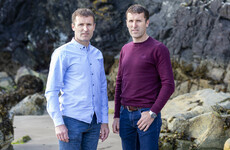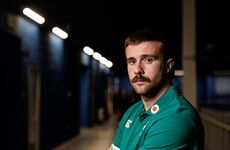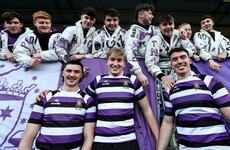THE CEILING ON Ireland’s Rugby World Cup achievements is not ornate, but it is extremely well established.
Over 32 years and eight editions of the tournament, Ireland — a small but central nation in rugby’s history — have never won a knockout match at the World Cup, losing six quarter-finals, a quarter-final play-off and exiting at the pool stage in 2007.
However, the Six Nations tournaments which preceded those performances on the world stage provide no hidden insight — aside, perhaps, from Ireland’s only two losses away to Wales in a World Cup year came in the last two cycles.
In 2015, Joe Schmidt’s side were Six Nations champions (on points difference after four wins and one loss) and went to England ranked third in the world, topped the pool with four wins. Then they crashed out to Argentina.
In 2011, Ireland had slipped to sixth in the rankings after a third-place finish in that year’s Six Nations featured an 11-13 away win over Italy and two losses. The thrived early on in New Zealand, topping the pool after beating Australia only to then lose to Wales, who were fourth in the Six Nations and went on to the semi-finals.
2007, let’s not drag that up again. Shane Horgan seemed to immediately regret raising that particular spectre during his post-match analysis on Virgin Media.
2003: Ireland are runner-up in the Six Nations again after being trounced at home in a Grand Slam decider. They push hosts Australia to the wire in a pool decider before it all unravels against France.
1999? Now we’re talking correlations. A Five Nations with only a win in Cardiff to celebrate is backed up emphatically by the nightmare of Lens.
1995: Fourth out of five again, but Wales were beaten in Cardiff and again in a pool stage clash in Johannesburg before Ireland came undone in Durban at French hands.
’91: Ireland’s epic battle with eventual champions Australia in a Lansdowne Road quarter-final was foreshadowed by (*checks note*) a share of last place with a draw to their name in the Five Nations.
And in ’87, a rousing run to second place (yes, including another win in Cardiff) was deflated by defeat to Wales in the new tournament’s opener in New Zealand and Australia nudged Ireland the rest of the way out in the last eight.
Long story short: there’s a lot of rugby to be played. Hitting form in the spring is all well and good, but it counts for little when the global tournament rolls around.
Another runners-up medal would appear the best finish Ireland could dare hope for from this year’s Six Nations – assuming they do not earn more points against France and Wales than England do at home to Italy and Scotland.
Yet even if the wheels come all the way off the wagon and Schmidt oversees his worst tournament to date, there will still be six months, complete with a summer holiday and a new pre-season, for Ireland to hit the refresh button and discover some form in Japan.
Maybe this group will even find a way to enjoy the games along the way, maybe a whiff of the underdog will suit them better than being the unstoppable steam-roller and maybe there will be no injuries or form issues for the key playmakers.
Still, whether this theoretical rich vein of fun and form will lead to a ceiling-smashing, history-making quarter-final win over South Africa or New Zealand is a whole other story.
Subscribe to our new podcast, The42 Rugby Weekly, here:














Wheres the McGrath requesting move to Ulster article? Number of other papers have already picked up on it.
@Kingshu: done deal
I can think of worse places to live/work/play…
Great dressing banter when the captain asks them to make the jersey proud …